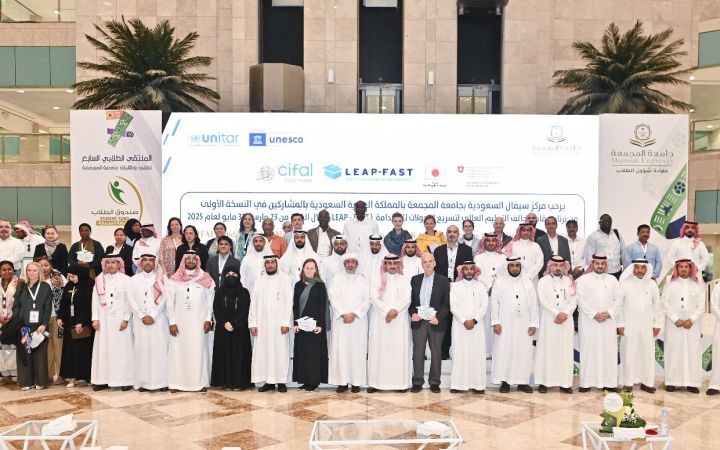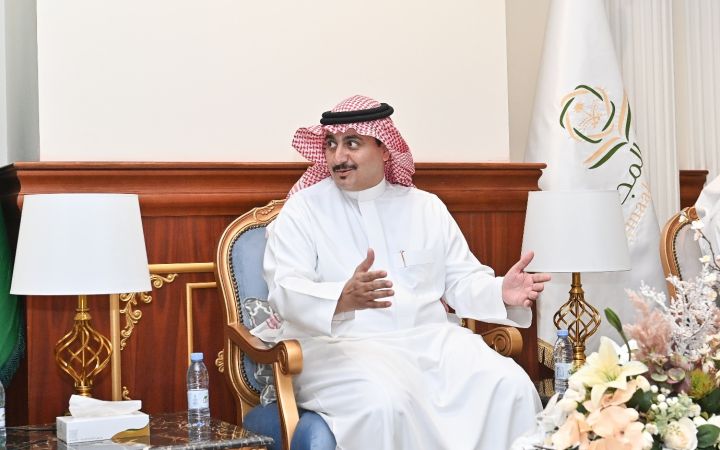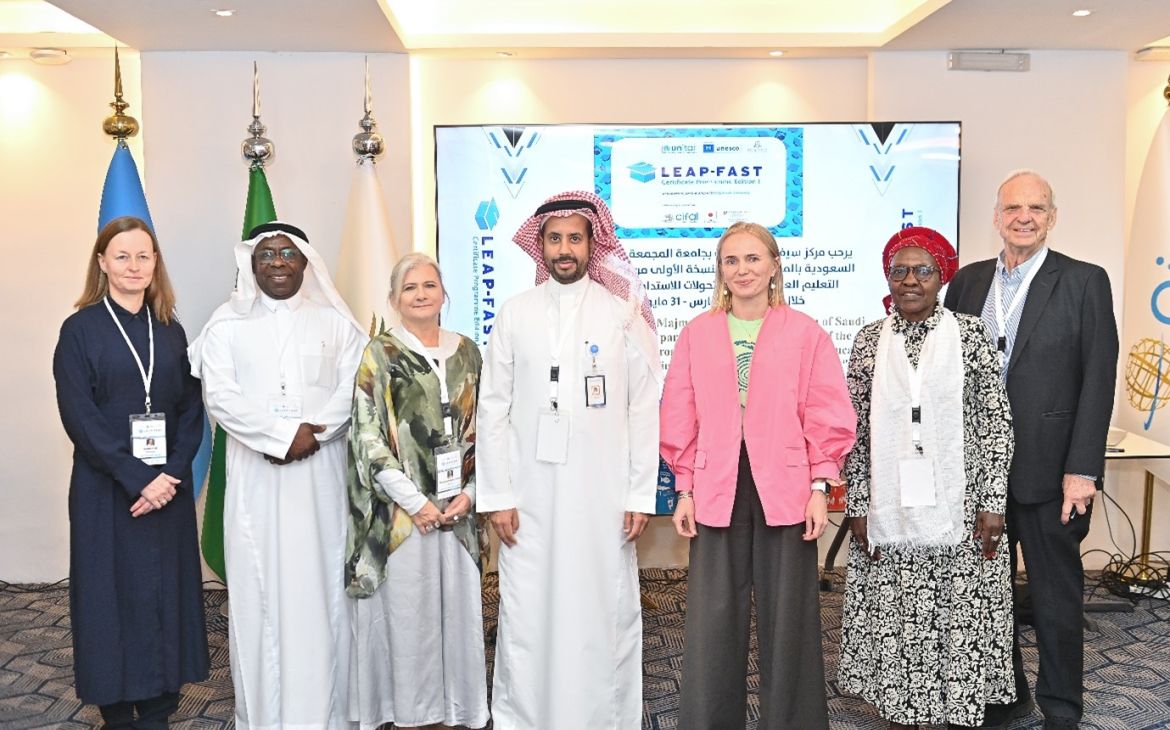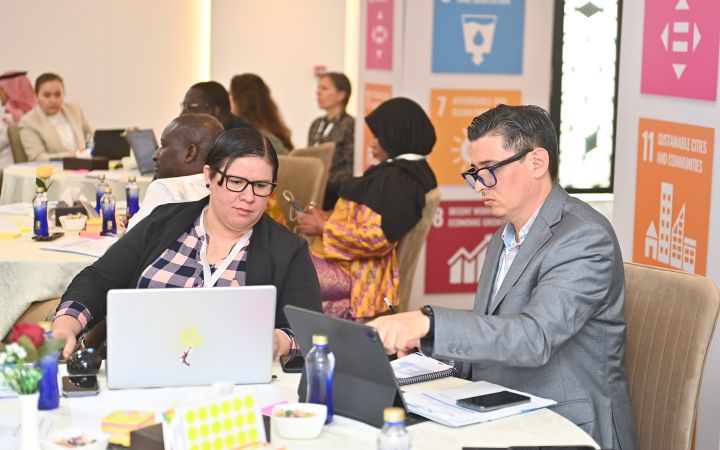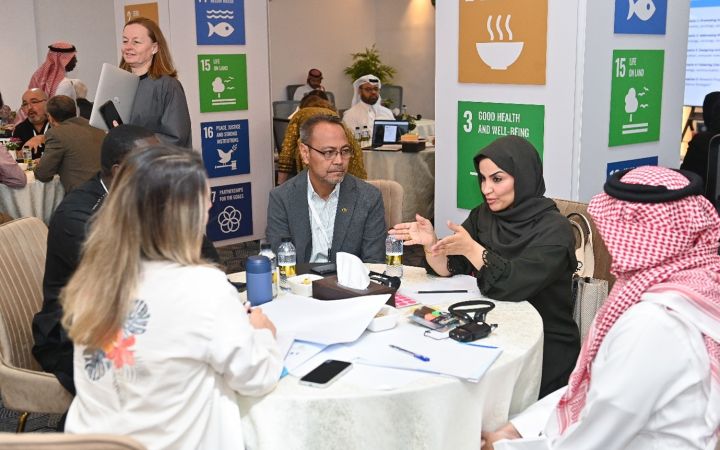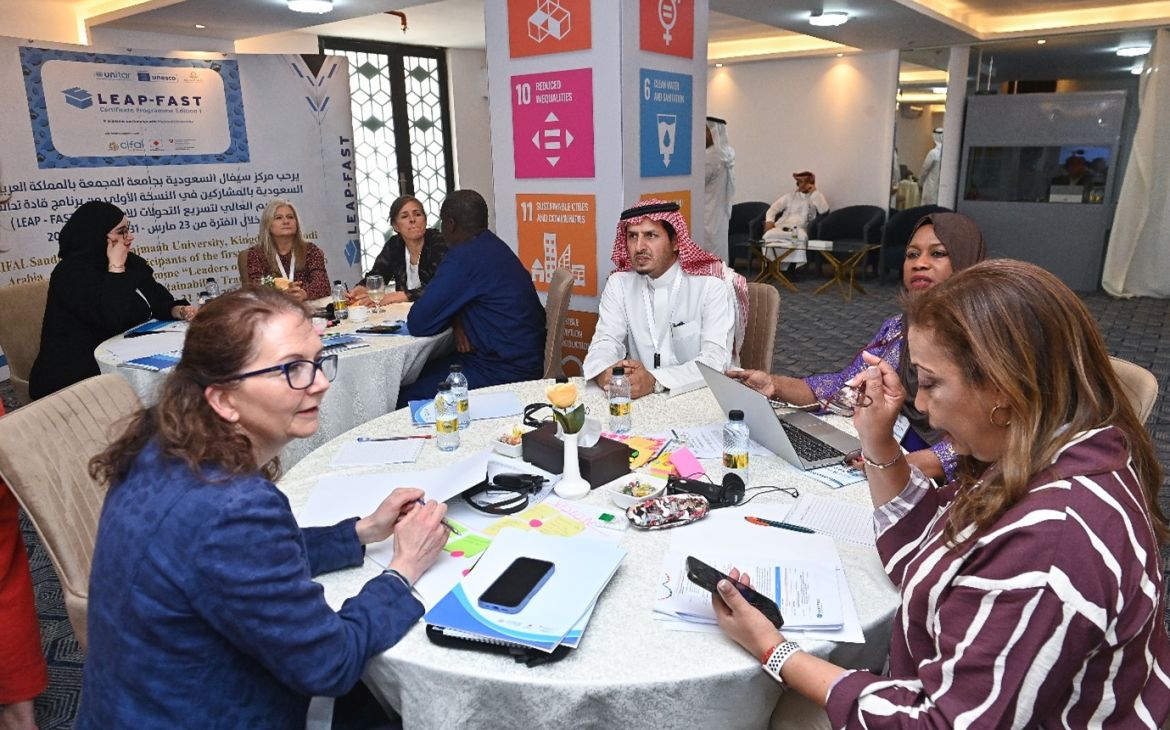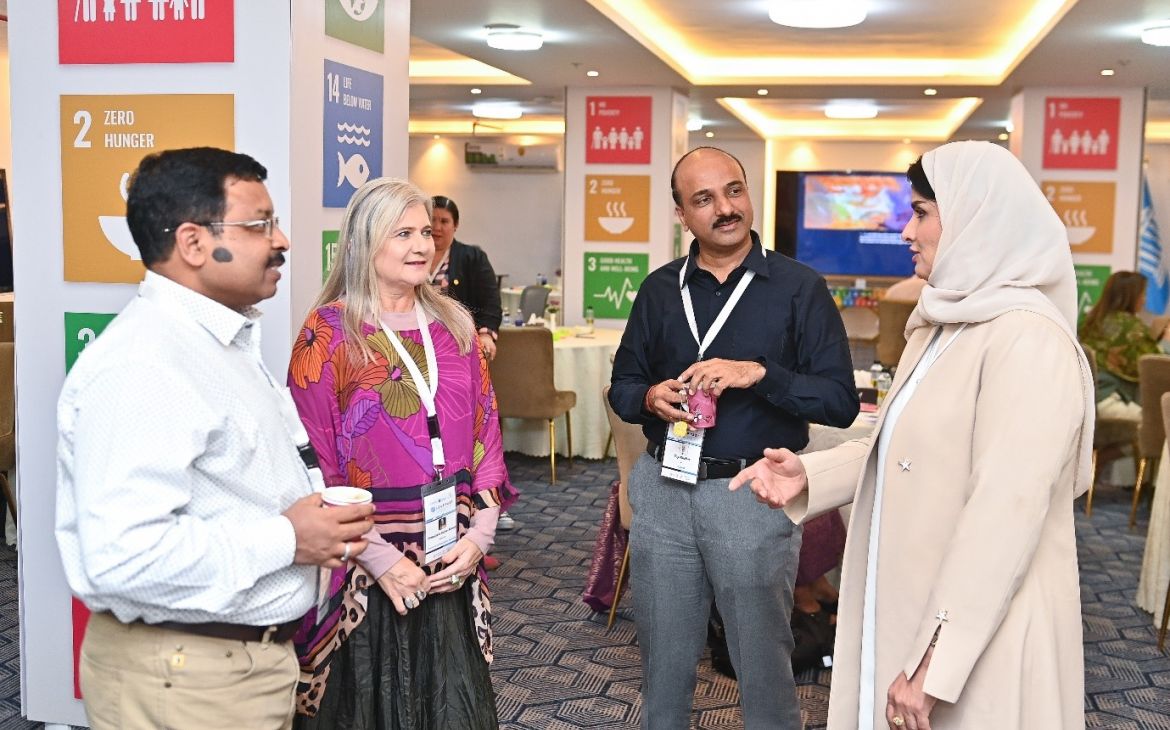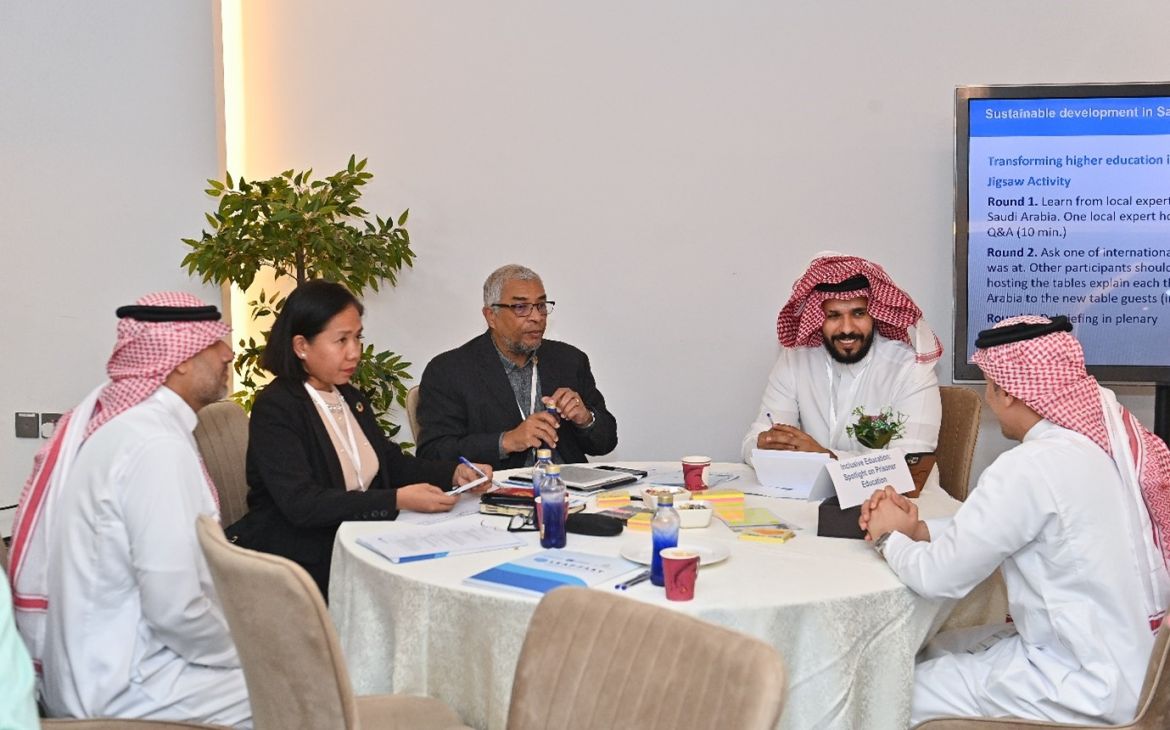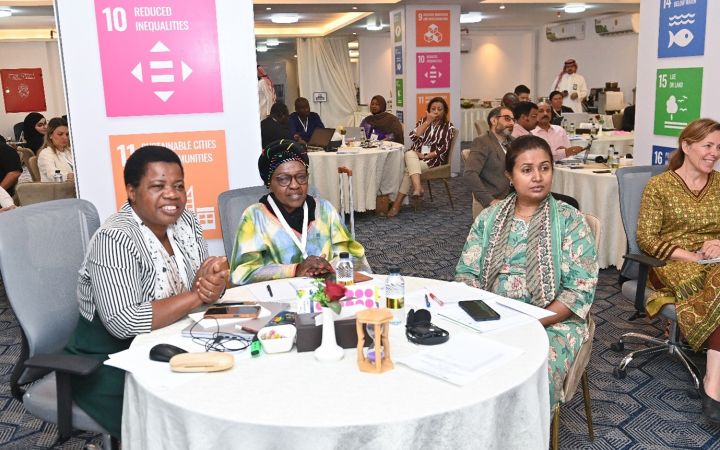30 May 2025, Geneva, Switzerland — As the world faces unprecedented ecological and societal challenges, higher education institutions are called upon to lead systemic transformations that advance sustainability and equity at scale. Educators and sustainability experts from around the world convened in Riyadh, Kingdom of Saudi Arabia, on 27 April - 1 May 2025 for a five-day co-creation workshop organized as part of the first edition of the Leaders in Higher Education Alliance and Programme – For Accelerating Sustainability Transformations (LEAP-FAST) Certificate Programme.
The workshop was hosted by Majmaah University, the academic partner of this first edition, and its affiliated center, CIFAL Saudi Arabia, which has been championing this joint effort by UNITAR and UNESCO to advance sustainability in higher education through systemic institutional change, curriculum and pedagogy innovation, and interdisciplinary learning.
Through the LEAP-FAST programme, we affirm our conviction that universities must lead sustainability transformations. Majmaah University is honored to contribute to this global movement and to inspire institutional innovation rooted in Vision 2030. – Prof. Saleh Almezel, Rector of Majmaah University
The Certificate Programme is part of a broader LEAP-FAST initiative by UNITAR and UNESCO, developed in 2023-2024. The initiative aims to create a global movement of committed sustainability leaders in higher education to advance deep transformations and enable HEIs to fulfil their potential with regards to the SDGs: by offering space for a collective reflection exercise, providing a global advocacy channel with UN, Governments, other stakeholders; demonstrating clear models of new generation HEIs and enabling HEIs serve as lighthouses regionally and nationally. The initiative was launched in July 2024 through the first Leadership Dialogue, bringing rectors and vice-rectors of participating Higher Education Institutions together. The Dialogue resulted in a joint statement presented at a dedicated side event of the 2024 High-level Political Forum on Sustainable Development, with a view to advocating for a greater role of higher education not only with universities but also with policy-makers and other stakeholders.
The workshop at Majmaah University has become a new opportunity for Higher Education Institutions (HEIs) to meet in person, this time for faculty members participating in the Certificate Programme. It took place following five intensive weeks of the online programme components, and has been an opportunity to dive deeper into the themes already covered in preceding weeks, addressing higher education transformations at the institutional and faculty levels. Designed as a dynamic exchange of ideas and experiences, the workshop blended expert facilitation with collaborative exercises, enabling participants to generate actionable strategies for transforming higher education and embed sustainability competencies in learning. Among key themes explored were transformations of higher education, including Whole-Institution Approach, inclusive & transformative learning experience, as well as the strengthening of focus on progressive development of sustainability competencies, inter-disciplinary and transdisciplinary approaches, and adaptation of learning strategies.
Representing the Universidad Nacional of Costa Rica (UNA) was a valuable opportunity to exchange strategies for integrating the SDGs into higher education, particularly within academic programs and curricula. Beyond the academic component, the outstanding organization and the hospitality we received truly stood out – we were treated like family, which strengthened the sense of community and collaboration among participating universities. We return with key insights and a renewed commitment to drive transformation within our institution. – Prof. Carolina Carillo-Artavia, UNA
Majmaah University and CIFAL Saudi Arabia, as a host, showcased Saudi Arabia’s emerging contributions to sustainable development. These efforts reflect Saudi Arabia’s broader strategic priorities under Vision 2030 to promote innovation, global collaboration, and sustainable development in education.
The workshop introduced a variety of interesting approaches and pedagogical methodologies that support learning for sustainability. Participants engaged in activities such as institutional force-field analysis, interdisciplinary curriculum labs, and a “wicked problem” challenge, as well as the importance of diverse perspectives in tackling complex sustainability issues
Throughout the week, the atmosphere was collaborative and solutions-oriented. Participants worked in rotating group formats—by institution, discipline, or region—to share insights and co-develop approaches that could be adapted to their respective contexts. Many of the sessions encouraged reflective thinking, including personal journaling and peer exchange, aimed at fostering long-term institutional leadership for sustainability. Participants also showcased their ongoing work. For example, Dr. Crystal Tremblay, Director CIFAL Victoria & Academic Lead SSH, presented their Community-based Participatory Research carried out at the University of Victoria, Canada.
As part of the co-creation process, participants also identified their own individual or institutional capstone projects. These capstone projects are intended to become pilot initiatives for sustainability transformation in higher education settings.
The co-creation workshop has reinforced a shared commitment to reshape higher education, moving from aspiration to action, building systems that equip and empower students, engage communities, and respond to the urgent challenges of our time.
A participant highlighted that –
The concept of sustainability competencies serves as a cornerstone for designing and initiating any sustainability-focused course or program. Understanding how to align these competences with the UN SDGs was, in my view, one of the most critical learning outcomes.
Participants emphasized the pivotal role of the LEAP-FAST programme as a catalytic global initiative enabling higher education institutions to lead sustainability transformations and set a high benchmark for what collaboration in higher education can achieve. The participants unanimously accepted the Pledge as an outcome of the workshop.
We pledge to embed sustainability into the core of our institutions—through education, research, and community engagement. We commit to fostering inclusion, championing climate action, and collaborating globally to accelerate progress on the SDGs, ensuring that higher education leads the way towards a just, peaceful, and sustainable future.
This inaugural edition sets the foundation for an enduring international network of transformative HEIs, building a platform for long-term impact and shared innovation. The workshop is followed by another 3 weeks of online training. The overall first edition of the LEAP-FAST Certificate Programme will then conclude with the summation week at the end of May 2025. A new edition is planned in autumn 2025 in academic partnership with Majmaah University, while the advocacy with leaders will continue through the consultations and dissemination of the Key Message of the LEAP-FAST Joint Statement. The success of the first edition of LEAP-FAST signals a new chapter in global higher education—one defined by shared vision, institutional courage, and transformative action toward a more just and sustainable world.


